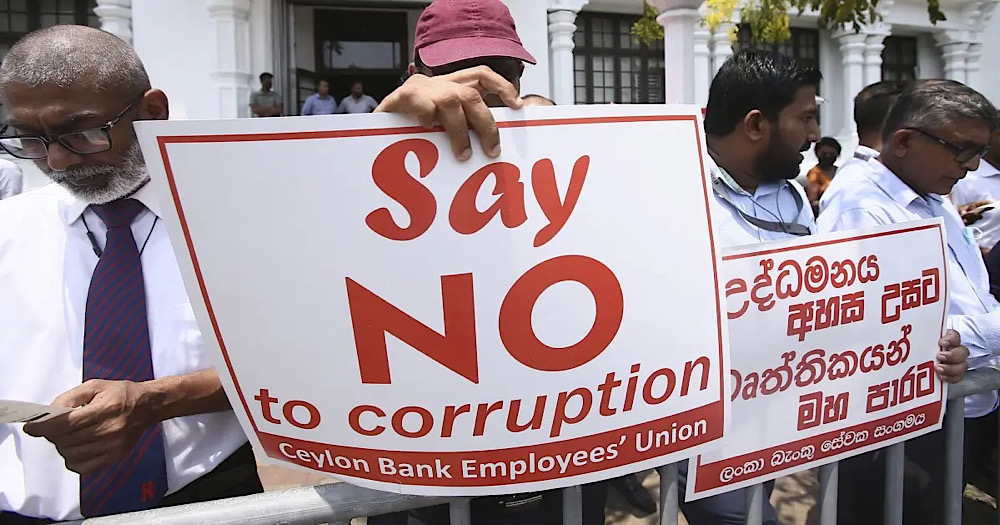Activists: financial aid to Colombo only with reforms and respect for rights
Human Rights Watch raises the alarm on the executive's regulations and bills that undermine political freedoms. The latest one concerns non-governmental organisations, whose application can lead to abuses and arbitrariness. The credibility and effectiveness of the International Monetary Fund programme is at risk.
Colombo (AsiaNews) - The International Monetary Fund (IMF) should remind the Sri Lankan government to respect rights and follow the reform plan, a condition to which the allocation of funds is linked, in particular blocking a bill that would severely limit the scope of civil society action.
This is what the international activist group Human Rights Watch (HRW) states in a letter sent to the IMF, published yesterday, underlining that some rules that the executive intends to approve would end up putting the very fund program for the island at risk.
The latest law at the center of the controversy is that on non-governmental organizations (in reference to registration and supervision), which risk limiting freedoms behind the facade of "good governance" and the "fight against corruption".
In the letter, the New York-based activist NGO recalls how the rescue plan for Sri Lanka drawn up by the IMF for three billion dollars, essential to stem the deep economic crisis and the 2022 default on foreign debt, is linked to the commitment on the subject of reforms. However, progress is threatened by the introduction of rules by the administration led by President Ranil Wickremesinghe that violate or severely restrict fundamental rights.
Among the elements of controversy is the Online Safety law, promulgated in January, whose definition of crime appears vague and arbitrary, applicable at discretion and which ends up punishing the so-called "speech crime" with long prison sentences.
Added to this is the Anti-Terrorism bill, currently being examined by Parliament, which contains new and extensive speech-related crimes and also in this case arbitrary and discretionary arrest powers. Finally, the bill for the Regulation of Non-Governmental Organizations which could make independent civil society activity on the island almost impossible.
“With the economic collapse in 2022, citizens have called for good governance and an end to corruption; now they are faced with draconian laws and policies that threaten rights and undermine reforms,” explains Meenakshi Ganguly, deputy Asia director at HRW. “The protests contributed,” he adds, “to bringing President Wickremesinghe to power, but instead of listening to calls for change, he is repressing peaceful dissent.”
A 2023 IMF study, known as the “Governance Diagnostic Assessment,” said that “anti-corruption efforts are unlikely to achieve their objectives if they do not also include initiatives designed and led by groups outside the government.”
These initiatives, the report continues, must be aimed at “rules-based inclusive economic and social progress”. In reality, the study shows that the participation of civil society in the supervision and monitoring of the executive is hindered by "limited transparency, lack of platforms for inclusive and participatory governance and broad application of anti-terrorism rules". As a result, the study concludes, “opportunities for public participation and control of official behavior, including by civil society, are increasingly restricted.”
On January 30, the government provided the draft law on NGOs to selected members of civil society, who had three weeks to respond. However, the text does not respond to any obvious need, but instead seeks to subject civil society organizations to control and interference by the authorities, threatening prison if the organizations and their members do not comply with cumbersome administrative procedures.
A few weeks later, on February 28, the "National Collective of CSOs and NGOs", a coalition of civil society organizations, wrote to the government that the proposed law "would violate the fundamental rights to freedom of association and expression". It also ends up damaging the provision of services by civil society organisations, including to “the many families struggling to make ends meet amidst severe economic difficulties”.
The UN High Commissioner for Human Rights Volker Türk in his update on March 1 said he was "concerned about the introduction of new laws or other proposals with a potentially far-reaching impact on fundamental rights and freedoms".
This is why, HRW concludes, the IMF should protect the credibility and effectiveness of its program in Sri Lanka by publicly asking the government to abandon the proposed law on NGOs. Added to this is the need to impose a moratorium on the use of the Online Safety Act and to amend the anti-terrorism law to ensure that it respects human rights standards.
(Photo taken from the Human Rights Watch website)
23/08/2022 13:20
25/05/2022 12:05







.png)










